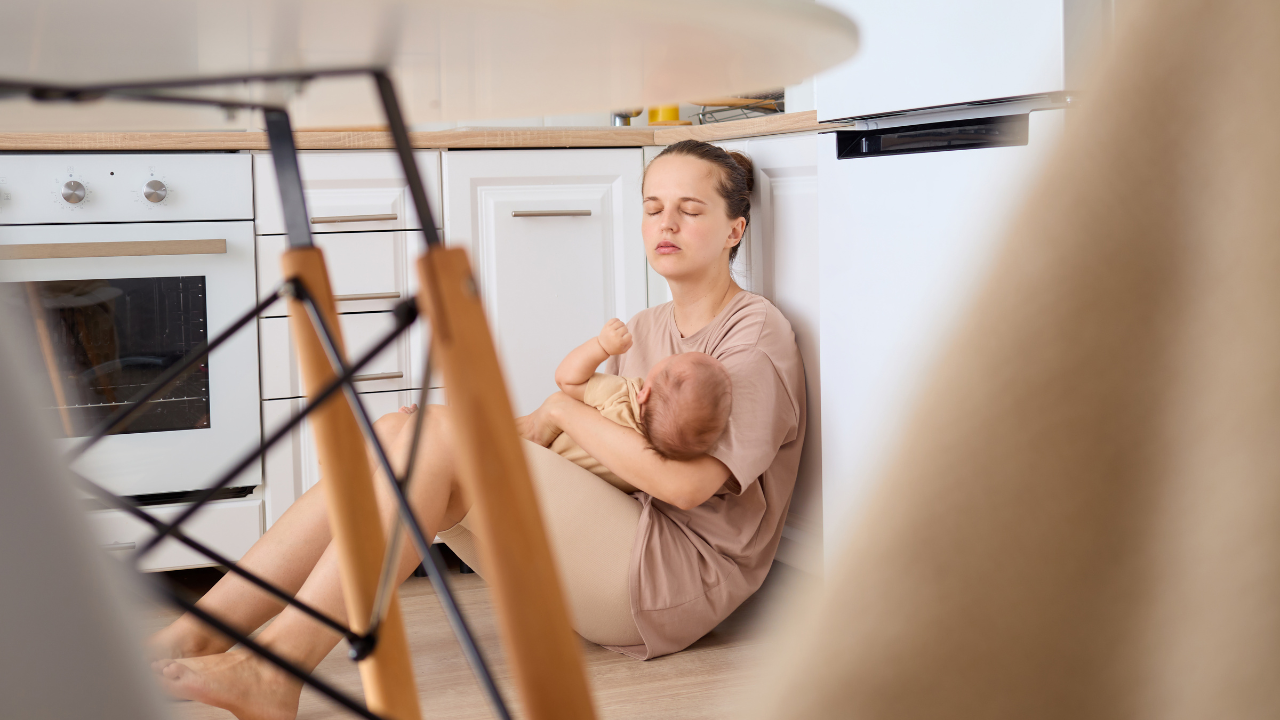Motherhood brings love, joy, and new beginnings, but it can also bring exhaustion, overwhelm, and emotions you never expected. Many moms wonder: Am I just tired, or could this be something more?
That’s exactly why we created this Postpartum Check-In. Think of it as a gentle mirror, a way to pause, reflect, and ask yourself how you’re really doing. Because your health matters, too.
What is Postpartum?
The postpartum period, often referred to as the “fourth trimester,” is the phase after birth when a woman’s body, emotions, mind, and identity adjust to motherhood. While society often focuses on the baby, the truth is: the mother is also born anew.
The postpartum period begins immediately after the delivery of the baby and placenta and lasts far longer than the traditional 6-week checkup suggests. In fact, the American College of Obstetricians and Gynecologists (ACOG) recognizes postpartum recovery as a minimum of 12 months long.
This period is broken down into three major phases:
- Acute Postpartum (0–6 weeks)
- Subacute Postpartum (6 weeks–6 months)
- Extended Postpartum (6 months–12+ months)
Each phase comes with specific physiological, psychological, and social transitions. Here’s what every new mom and postpartum professional should know.
The Three Phases of Postpartum
Postpartum isn’t just the six-week check-up; it’s a year (or more) of healing and adjustment that unfolds in phases:
-
Acute Postpartum (0–6 weeks): The “fourth trimester,” marked by uterine involution, lochia, perineal or C-section healing, and intense hormonal shifts that can trigger baby blues.
-
Subacute Postpartum (6 weeks–6 months): A critical but overlooked stage when pelvic floor dysfunction, diastasis recti, and menstruation return appear, alongside heightened risk for postpartum depression, anxiety, OCD, or PTSD. This is also when identity shifts and relationship strain often surface.
-
Extended Postpartum (6–12+ months): A redefinition stage where many moms face ongoing breastfeeding or weaning transitions, unresolved pelvic pain, return-to-work stress, postpartum rage, or chronic depression if untreated. Social reintegration and balancing motherhood with career are key themes here.
Each phase requires its own care plan: from physical recovery and pelvic floor therapy to mental health support and social reconnection. By understanding these stages, moms and families can approach postpartum with compassion, awareness, and the right resources.
Emotional Well-Being: Beyond the Baby Blues
It’s normal to feel tearful or emotional after birth. Up to 80% of moms experience “baby blues.” But if sadness, guilt, or feeling “like a bad mom” lingers past two weeks, it may be more than hormones. Persistent sadness, anxiety, or emotional numbness can be signs of postpartum depression or anxiety, conditions that are common and treatable with the right support.
Physical Recovery Matters Too
Your body has just done something extraordinary, but recovery is often overlooked. Chronic fatigue, pain that won’t go away, appetite changes, or lack of sleep (fewer than 4–5 hours in 24 hours) can quickly affect both your physical and emotional health.
Seeing a doctor or postpartum specialist isn’t selfish; it’s essential. Your healing matters just as much as your baby’s growth.
The Invisible Weight: Mental Load and Identity
Many moms quietly carry the full weight of household management, baby care, and emotional labor. This “mental load” is exhausting and often invisible to others. If you feel like you’ve lost yourself, avoid asking for help, or catch yourself thinking, “I can’t do this,” you’re not failing; you’re simply carrying too much alone.
A Gentle Reflection
If you answered “yes” or “often” to many of these feelings, you may be carrying more than you should have to. This isn’t a diagnosis — it’s a signal. A reminder that you are not weak, not broken, and definitely not alone.

10 FAQs About Postpartum Mental and Emotional Health
1. How do I know if it’s just exhaustion or postpartum depression?
Exhaustion usually improves with rest. Depression feels heavier, doesn’t lift even after sleep, and often comes with guilt, loss of joy, or hopelessness.
2. What if I feel anxious all the time?
Postpartum anxiety is common. Constant worrying, racing thoughts, or intrusive fears (like something bad happening to the baby) are signals to seek support.
3. Is it normal to feel like I’ve lost myself after becoming a mom?
Yes. Identity shifts are part of matrescence (the transition to motherhood). Support helps you rediscover who you are with this new role.
4. How long do the baby blues last?
Typically 1–2 weeks. If sadness or mood swings last longer, it may be postpartum depression or anxiety.
5. I avoid asking for help. Is that normal?
Many moms struggle with guilt around asking for help, but needing support is natural. It doesn’t make you less of a mother.
6. What if I can’t bond with my baby right away?
Bonding sometimes takes time, especially if birth was traumatic or recovery is difficult. Therapy and support can help bridge that gap.
7. Can physical pain affect my mental health?
Absolutely. Lingering pain or medical issues can worsen emotional struggles. Always address physical healing along with emotional well-being.
8. Do I need therapy even if I’m not “that bad”?
Yes. Therapy isn’t just for a crisis. It’s also for stress management, self-discovery, and support during transitions.
9. What role does my partner play?
Partners can also experience postpartum stress or depression. Open communication and shared responsibilities help both parents thrive.
10. How do I know when to reach out for professional help?
If your struggles interfere with daily life, bonding with your baby, or your ability to care for yourself, it’s time to reach out.
Try the Postpartum Check-In Quiz
Take a moment with yourself. Answer questions about your emotions, sleep, appetite, identity, and stress. Be honest and gentle. This is about awareness, not judgment.
👉 Take the Momkinz Postpartum Check-In Quiz
How Momkinz Can Help
At Momkinz, we believe that postpartum isn’t something to “get through” — it’s a season of life that deserves the same care, planning, and support as pregnancy itself. Too often, moms are told to be strong, to bounce back quickly, or to put themselves last. But we know the truth: you matter just as much as your baby.
That’s why we created Momkinz, a safe, supportive space where no mother has to walk this journey alone. Whether you’re recovering from a C-section, navigating the ups and downs of breastfeeding, struggling with sleep deprivation, or quietly carrying the weight of postpartum depression, you don’t have to do it all by yourself.
Through our platform, you can connect with trusted postpartum doulas, therapists, lactation consultants, pelvic floor specialists, sleep coaches, and more professionals who understand the challenges and joys of new motherhood. More than just services, Momkinz is a community: a place to feel seen, heard, and cared for.
💜 You are not broken. You are not failing. You are becoming. And we are here to remind you that your healing, your happiness, and your well-being are just as important as your baby’s milestones.
Let Momkinz walk beside you because motherhood isn’t meant to be a solo journey.



